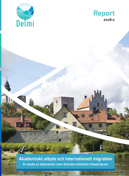Historically, internationalization of Swedish higher education institutions (HEIs) has been intended to contribute to both educational quality and international development. In 2011, the Swedish government introduced tuition fees for third country nationals. The Delmi report International students in Sweden before and after the introduction of tuition fees examines the consequences of the introduction of tuition fees for the number as well as the composition of international students. The report shows that the number of third country students following the reform has decreased significantly, especially from poor and less democratic countries.
The report highlights the following conflicting educational policy objectives:
- The introduction of tuition fees led to a decrease in the total number of international students at HEIs. This stands in conflict with the overarching objective to increase the internationalization of HEIs.
- The changed composition of students—marked especially by a decrease in the number of students from developing countries—stands in conflict with objectives to increase the diversity at HEIs, combating poverty, and democratic development.
- The decrease of students in science and technology is problematic given Sweden’s recruitment needs in technology and research.
The report is written by André Bryntesson, B.A. in Political Science and qualified subject teacher for upper-secondary school, and Mikael Börjesson, Professor in Sociology of Education, both at The Swedish Centre for Studies of the Internationalization of Higher Education, Uppsala University.
Picture by StockSnap from Pixabay.

